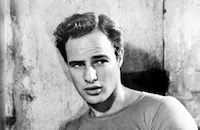The Formula

Brief Synopsis
Cast & Crew
John G. Avildsen
George C Scott
Marlon Brando
Marthe Keller
Gerry Murphy
Paul Glawion
Film Details
Technical Specs
Synopsis
During World War II, the Nazis developed a formula for synthetic fuel. The formula disappeared after the war, and several people who were connected with its development died under questionable circumstances over the following thirty-five years. Police officer Barney Caine, a friend of one of these people, is trying to solve the mystery of his death. As Caine works on the case, he uncovers a wide-spread conspiracy to manipulate fuel prices around the world.
Director
John G. Avildsen
Cast

George C Scott

Marlon Brando
Marthe Keller
Gerry Murphy
Paul Glawion
Herbert Voland
Rene Kolldehoff
Emil Steinberger

Wolfgang Preiss
Wendy Baldock
Janos Gonczol
Francisco Prado
Sandie Lawrence
Jane Faithe

John Gielgud
Stephanie Edwards
Diane Tyler
Ursula Warel
Robin Clarke
Heinz Kammer
Ursula Hamann
John Van Dreelen
Werner Kreindl
Ferdy Mayne

Marshall Thompson

Beatrice Straight
Ike Eisenmann
Alan North
Dieter Schidor

Craig T. Nelson
Ernie Fuentes
Reinhardt Vom Bauer
Louis Basile
Tom Hall
Lavelle Roby
Martin Brandt
G. D. Spradlin
Jan Niklas
Ric Mancini
Calvin Jung
Jim Brewer
David Byrd
Emily Jensen
Albert Carrier

Richard Lynch
Nathan Roberts
Weston Gavin
Crew
Del Acevedo
Candace Allen
Renate Arbes
John G. Avildsen
Michael A Benson
Herman A Blumenthal
David Bretherton
John N Carter
Bill Conti
James A. Crabe
James A. Crabe
Evelyn Dohring
Willy Egger
Horbert Finck
Don French
Russell Goble
Charles Grenzbach
Jay M Harding
Ted Harrison
Caro Jones
Hans-jurgen Kiebach
Michael J Kohut
Jane Kurson
Dick Lane
Sandy Lawrence
Catherine Leterrier
Harry V Lojewski
Elliot Marks
Jo Mccarthy
Dieter Meyer
Bill Millie
Theo Nischwitz
Al Overton
Lee Poll
Ana Maria Quintana
Bob Ramae
Shirley Rich
Richard Richtsfeld
John Riordan
Karl W Schaper
Eve-marie Schonecker
Ilse Schwarzwald
Steve Shagan
Steve Shagan
Steve Shagan
Ken Swor
Ken Swor
Bill Thomas
Hasso Von Hugo
Bob Whitaker
George Whitear
Dwight Williams
Joe Zaidman
Stefan Zurcher
Videos
Movie Clip



Film Details
Technical Specs
Award Nominations
Best Cinematography
Articles
The Formula
Beyond adapting his own novel for the screen, author Steve Shagan also served as producer for the project, which opens as the Third Reich is collapsing, and General Helmut Kladen (Richard Lynch) is breaking from Berlin with a truckload of Nazi science documentation, hoping to use it as a bargaining chip for amnesty. The convoy is waylaid by a detail headed by a Major Tom Neeley (Robin Clarke), who is all to keen to discover what peacetime benefits - of a monetary nature - could be had from the secrets therein.
Fade to present-day Los Angeles, where veteran police lieutenant Barney Caine (Scott) is rousted from a precious visitation with his teenage son to look into the shooting death of an old friend. The friend turns out to be Neeley, who had become a cop and then a prosperous business fixer, and whose corpse was found festooned with various red herrings pointing to drugs, hookers and voodoo.
The leads that bother Caine the most, though, all point back to a recent, mysterious junket that Neeley had recently taken to Germany, and Neeley's business dealings with the porcine oil man Adam Steiffel (Brando). Caine wheedles permission from his superiors to take the investigation to Berlin; as the trail grows hotter, those willing to talk, from Neeley's estranged widow (Beatrice Straight) to his German contact, a utility engineer named Obermann (David Byrd), start turning up dead.
Before his murder, however, Obermann tips Caine to what is in fact at stake in the mystery; an efficient method, developed by the Reich's scientists, of synthesizing oil from coal. Caine turns to one of his interrogees, Obermann's attractive niece Lisa Spangler (Marthe Keller), for her assistance in rooting out Obermann's WWII-era contacts in pursuit of the valuable secret, while trying to avoid those dangerous forces with a vested interest in keeping the secret buried.
With a narrative laden with far too many false leads and loose ends, keeping up with The Formula is daunting, to say the least. Relations broke down between Shagan and director John G. Avildsen in the course of post-production; the two went as far as to take the acrimony public in the L.A. Times' letters page, and Avildsen made an unsuccessful bid to have his name removed from the finished product. The Formula wound up only making around $9 million in its domestic run, and, save for James Crabe's cinematography, was wholly forgotten at Oscar® time.
In his 1994 autobiography Songs My Mother Taught Me (Random House), Brando would be dismissive of the project as a "stinker"; the then-cash-strapped actor was paid $3 million for his three scenes in The Formula. He did, however, expound upon the fact that the hearing aid that he wore in character as Steiffel was in fact feeding him his lines as he performed. "It took a little practice, but it wasn't hard, and because the earphones were small and hidden, audiences didn't know the difference," the actor wrote. "When I repeat the lines simultaneously, the effect is one of spontaneity." The experience was sufficiently chilling that Brando wound up taking a near-decade hiatus from screen acting that ended with his Oscar®-nominated work in A Dry White Season (1989).
Producer: Steve Shagan
Director: John G. Avildsen
Screenplay: Steve Shagan; Steve Shagan (novel)
Cinematography: James Crabe
Music: Bill Conti
Film Editing: John Carter
Cast: George C. Scott (Lt. Barney Caine LAPD), Marlon Brando (Adam Steiffel, Chairman Titan Oil), Marthe Keller (Lisa Spangler), John Gielgud (Dr. Abraham Esau, Director Reich Energy), G.D. Spradlin (Arthur Clements), Beatrice Straight (Kay Neeley), Richard Lynch (General Helmut Kladen /Frank Tedesco), John Van Dreelen (Hans Lehman, Prefect of Police Berlin).
C-117m. Letterboxed.
by Jay S. Steinberg

The Formula
Quotes
Trivia
Miscellaneous Notes
Released in United States 1980
Released in United States 1980













